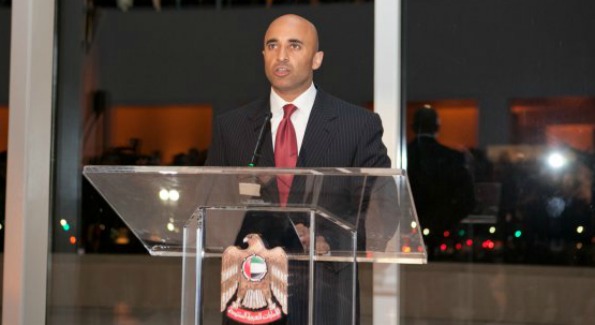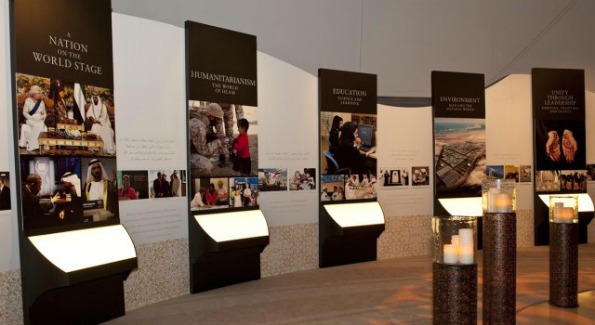United Arab Emirates honors their nation’s 40th National Day.
By John Arundel
What once was known as “Pirate Coast” and later the sandy and barren “Trucial Oman” is these days the United Arab Emirates, an oil-rich collection of seven monarchies along the Arabian Peninsula. In 1971, it was all the grand idea of the nation’s founder and first president, Sheikh Zayed, who was celebrated for creating what is today among the world’s wealthiest developed economies.
In honor of the nation’s 40th National Day, UAE’s Embassy welcomed guests at a gala reception that honored the life and vision of the late founder and first president of the UAE, His Highness Sheikh Zayed bin Sultan Al Nahyan.
The event was hosted by UAE Ambassador to the US Yousef Al Otaiba and his wife Abeer Al Otaiba at the new headquarters of the United States Institute of Peace and featured a commemorative exhibit on the life of Sheikh Zayed, and the principles that guided the UAE’s development into a modern, progressive nation.
Guests included top-ranking administration officials, diplomats and ambassadors from around the world, as well as distinguished academics, business executives and prominent members of the press corps.
“This is a proud day for all Emiratis as we celebrate the significant progress our nation has made in just four decades,” said Al Otaiba. “Sheikh Zayed’s vision has guided the UAE’s development, and his legacy is our modern society, which is a growing center for innovation and commerce, and magnet of opportunity for people.”
Otaiba said he chose to hold the 40th National Day event at the dramatic new Institute of Peace building across from the State Department to mark the nation’s commitment to peace and charity.
“Sheikh Zayed held these values in high regard, and they are shared with the Institute of Peace through the organization’s mission to manage international conflict without violence,” he said.
In his remarks, Otaiba also congratulated UAE president, His Highness Sheikh Khalifa bin Zayed Al Nahyan, and vice president and prime minister of UAE and ruler of Dubai, His Highness Sheikh Mohammed bin Rashid Al Maktoum, as well as the Federation’s other leaders.
In his speech, Otaiba stressed the “strong bilateral relationship” between the UAE and United States and noted that the U.S. was one of the first countries to recognize the federation 40 years ago.
“On behalf of President Obama and the people of the United States, I am delighted to send best wishes to the people of the United Arab Emirates as you celebrate your National Day,” Secretary of State Hillary Clinton said in a prepared statement. “The UAE has made remarkable gains over the past 40 years expanding economic opportunity, education, and health care. These impressive achievements serve as a beacon for countries around the world seeking to build a brighter future.”
The U.S. and UAE share a long history of friendship and cooperation, Clinton said. “Today, our two countries are working together to promote peace and security, support economic growth and improve educational opportunities in the region and around the world,” she said. “I wish all Emiratis a safe and happy celebration on this special day.
Congratulations and best wishes for a year of peace and prosperity.”
Prior to declaring its independence in 1971, the UAE was known as the Trucial States or Trucial Oman, in reference to a 19th-century truce between the local sheikhs, hereditary rulers of the territories, and the United Kingdom. From the 18th to the 20th centuries, the term “Pirate Coast” was also used by some to refer to the emirates, owing to the large number of pirates who operated from Emirati ports.
Today, the UAE is a federation of seven emirates (or principalities), each governed by a hereditary emir and a single national president.
The Emirates are located in the southeast corner of the Arabian Peninsula on the Persian Gulf, bordering Oman and Saudi Arabia, and sharing sea borders with Iraq, Kuwait, Bahrain, Qatar, and Iran. Its oil reserves are ranked the world’s sixth largest and it possesses one of the most developed economies in West Asia.
“The US has been an important ally of the UAE since its founding in 1971,” Otaiba said. “From a shared commitment to regional security, to growing economic, trade and cultural connections, our partnership has never been stronger.”






